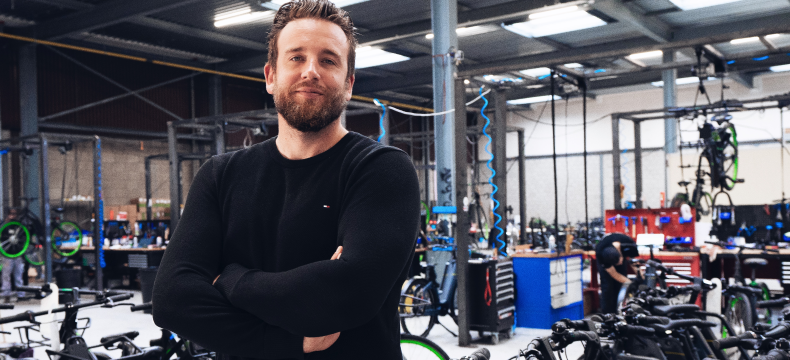Jan Willem Wieringa is a veteran of the plastics and packaging industry. Now the CEO of Desch Plantpak, which manufactures plant pots, trays and bedding packs, he remembers a time before plastics recycling was standard. He tells us about the challenges of working in an energy-intensive business, and how Desch and the wider industry have already come a long way with recycling and energy efficient technology.

Jan Willem Wieringa, CEO Desch Plantpak
How has the coronavirus pandemic affected Desch Plantpak?
We've seen a growth in demand in the past 12 months, but this has been followed by an unprecedented shortage in key raw materials for us – mainly recycled plastics. And the cost of these materials has also increased enormously.
So the biggest challenge today is getting enough 'good enough’ recycled material to keep our machines running, and to rebuild our stocks and keep up with demand. But let's hope that this materials shortage is temporary, and that growing demand leads to more investment to make sure that the volume of recycled material increases.
I find it bizarre that every day we still burn a lot of mixed waste that contains recyclable plastic.
What would it take to increase plastics recycling and use?
With the price of virgin plastic being very high, and some countries looking to implement a plastic tax, the business case to develop and expand recycled plastic volumes becomes easier.
Last year, virgin plastic was about €1 per kilogramme. It is now closer to €2 per kilogramme, so it becomes easier to recoup the reprocessing costs to recycle plastics. The higher the price per kilo, the harder companies will work on reduce and redesign. Some tax measures might provide incentives to increase the percentage of recycled materials. I find it bizarre that every day we still burn a lot of mixed waste that contains recyclable plastic.
Our sector is way ahead of the curve already, and uses mainly recycled plastics. Horticulture has been using it for decades – before it became trendy and before there were sustainability managers. Why? Because it was cheaper. That's how a lot of these things start.
As a sector, we've come a long way – the first plastic flowerpot 20 or 30 years ago was much heavier than it is today – but there are plenty of applications where there may still be room to reduce the amount of raw material.
What do you think about public opinion and demands to quit plastics altogether?
The pressure from public opinion is already pushing companies to be more sustainable. Plastic has a negative image because of careless consumers just throwing it away and waste processing systems that are not good enough – particularly in Asia. Plastic is a fantastic material, and we cannot live without it. But we must solve the pollution problem we have, which is everyone’s responsibility.
The virgin producers and the big factories that are now running mainly on oil also want to step up efforts to use plastic that has already been produced, which I think is great.
What efforts are you making to lower CO2 emissions across the supply chain and in manufacturing?
Energy usage in our sector, where plastic conversion is concerned, is high. We have to heat up the machines to make the plastic melt. But every time we buy a new machine, the energy consumption per product produced is lower. We are actually speeding up investments, because there is a good rate of return as it also reduces our energy costs.
In addition to energy efficiencies, we are using renewable energy in some places. In Waalwijk, our biggest factory, we have rented warehouses and covered them with solar panels and are looking to do the same with a recent factory acquisition in Poland.
Plastic is a fantastic material, and we cannot live without it. But we must solve the pollution problem we have, which is everyone’s responsibility.
How do you see demand for your products developing in the next few years?
We have grown rapidly since June 2020 and have seen months with exceptional growth numbers. Of course, we are wondering whether this is sustainable: what will happen post-Covid, whenever that may be?
Yes, people will travel more again, but we believe that many people have a new appreciation for everything green. The ability to work more from home seems to be staying, which means more people are moving away from busy and expensive cities and into suburbs with gardens. That will support the trend of growing our own food and herbs.
We acquired IPP (Interplast Plastic Products) in September 2020, which gave us two more factories. So although we might not see a repeat of the massive growth of early 2021, we are still fairly positive about our sales development in the next few years. Rather than looking for where to grow, we are in the luxurious position of trying to keep up with demand.
How do you think we can make the most difference?
Education should improve. We should focus more on teaching kids basic life skills, like the importance of healthy food, exercise, basic lessons in how to spend your money and how to be a responsible citizen. When I was a kid, we had a lesson in how water was purified, and to this day I still turn off the tap when I brush my teeth. The earlier we teach these things, the better our chance of lasting change.


